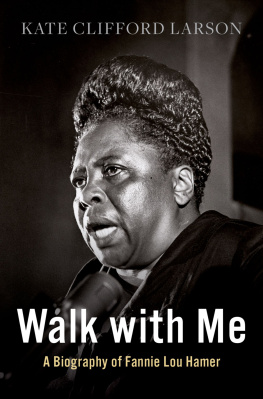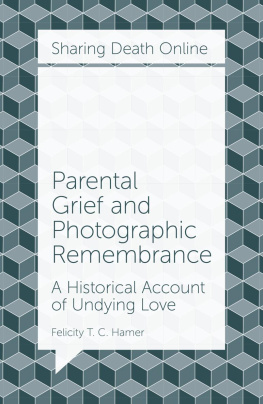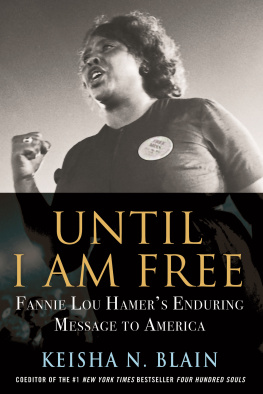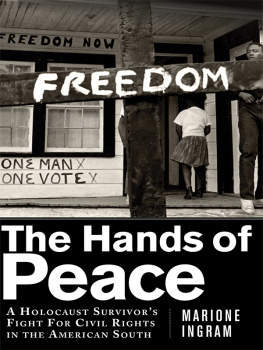Maegan Parker Brooks.
Photo credit, Frank Miller.
Maegan Parker Brooks, PhD, teaches in the Civic Communication and Media Department and the American Ethic Studies Program at Willamette University in Salem, Oregon. Brooks also directs Find Your Voice: The Online Resource for Fannie Lou Hamer Studies (findyourvoice.willamette.edu), a website which hosts a K-12 curriculum project she developed in partnership with civil rights scholars and public school teachers in the Mississippi Delta. All resources on the site are provided free of charge, including Brookss childrens book, Planting Seeds: The Life and Legacy of Fannie Lou Hamer (illustrated by Shelby McConville). Brooks has previously published two books about Fannie Lou Hamer. The first was an anthology of Hamers speeches, which she co-edited with Davis W. Houck, entitled The Speeches of Fannie Lou Hamer: To Tell It Like It Is. The second was a rhetorical biography, A Voice that Could Stir an Army: Fannie Lou Hamer and the Rhetoric of the Black Freedom Movement, which was named an Outstanding Academic Title of 2015 by the American Library Association. Brooks served on the board of the Fannie Lou Hamer Statue and Education Fund; she also served as a lead researcher for the documentary film Fannie Lou Hamers America and as a consultant for the Fannie Lou Hamer BrainPOP animation.

Fannie Lou Hamer
THE LIBRARY OF AFRICAN AMERICAN BIOGRAPHY
General Editor, John David Smith
Charles H. Stone Distinguished Professor of American History
University of North Carolina at Charlotte
The Library of African American Biography aims to provide concise, readable, and up-to-date lives of leading black figures in American history, in widely varying fields of accomplishment. The books are written by accomplished scholars and writers, and reflect the most recent historical research and critical interpretation. Illustrated with photographs, they are designed for general informed readers as well as for students.
Fannie Lou Hamer: Americas Freedom Fighting Woman, Maegan Parker Brooks (2020)
Jackie Robinson: An Integrated Life, J. Christopher Schutz (2016)
W. E. B. Du Bois: An American Intellectual and Activist, Shawn Leigh Alexander (2015)
Paul Robeson: A Life of Activism and Art, Lindsey R. Swindall (2013)
Ella Baker: Community Organizer of the Civil Rights Movement, J. Todd Moye (2013)
Booker T. Washington: Black Leadership in the Age of Jim Crow, Raymond W. Smock (2010)
Walter White: The Dilemma of Black Identity in America, Thomas Dyja (2010)
Richard Wright: From Black Boy to World Citizen, Jennifer Jensen Wallach (2010)
Louis Armstrong: The Soundtrack of the American Experience, David Stricklin (2010)
Published by Rowman & Littlefield
An imprint of The Rowman & Littlefield Publishing Group, Inc.
4501 Forbes Boulevard, Suite 200, Lanham, Maryland 20706
www.rowman.com
6 Tinworth Street, London SE11 5AL, United Kingdom
Copyright 2020 by The Rowman & Littlefield Publishing Group, Inc.
All rights reserved. No part of this book may be reproduced in any form or by any electronic or mechanical means, including information storage and retrieval systems, without written permission from the publisher, except by a reviewer who may quote passages in a review.
British Library Cataloguing in Publication Information Available
Library of Congress Cataloging-in-Publication Data
978-1-5381-1594-7 (cloth)
978-1-5381-1595-4 (electronic)
 The paper used in this publication meets the minimum requirements of American National Standard for Information SciencesPermanence of Paper for Printed Library Materials, ANSI/NISO Z39.481992.
The paper used in this publication meets the minimum requirements of American National Standard for Information SciencesPermanence of Paper for Printed Library Materials, ANSI/NISO Z39.481992.
For Evie, Sawyer, and the next generation of freedom fighters
Contents
Guide
I n a smoke-filled Atlantic City hotel ballroom, Fannie Lou Hamer limped toward the dais. White purse clutched in her right hand and a Mississippi Freedom Democratic Party (MFDP) badge affixed to the chest of her flowery dress, she took her seat. Hamer shifted nervously as a microphone was fastened to her lapel. One hundred and eight credentials committee members sat in rows across from her. The credentials committee was tasked with determining which delegation sent from Mississippi would be seated at the 1964 Democratic National Convention (DNC). Would it be the party known as the Regulars, an all-white delegation, representative of the states white supremacist election machinery? Or would the credentials committee members risk a southern Dixiecrat walk-out and vote to replace the segregationist delegation with the racially integrated MFDP?
Camera crews from all three major networks lined the back of the ballroom. The sixty-eight members of the segregationist Mississippi delegation sat, arms crossed, glowering at Hamer as she spoke. Mr. Chairman, and to the Credentials Committee, my name is Mrs. Fannie Lou Hamer and I live at 626 East Lafayette Street, Ruleville, Mississippi, Sunflower County, the home of Senator James O. Eastland and Senator Stennis. With this seemingly straightforward introduction, Hamer defied the white supremacist norm of refusing black women the courtesy title Mrs. She boldly shared her address with terrorists, including those who had recently flooded her home with threatening phone calls, as well as those who had fired shots into a home where she had taken refuge. And with this seemingly simple introduction, Hamer set the stage for a core claim that would animate her activist career: Nobodys free until everybodys free.
Over the next thirteen years, Hamer unpacked this aphorism for audiences across the nation. Hamer told audiences from Harlem to Seattle that because the white supremacist election machinery in her state sent representatives to the US Senate and to the House of Representatives and because these legislators sat on powerful committees and voted for laws and policies that governed us all, voter discrimination in Mississippi was not just a problem for black people in her home state. Voter discrimination posed a death threat to our democracy.
On that late August afternoon in the Atlantic City hotel ballroom, Hamer provided evidence of her oppression to expose the limits of Americas foundational ideals. She told the 1964 DNC credentials committee about being fired and evicted from the Delta plantation where she had labored for eighteen years because she tried to register to vote. She testified that white supremacist night-riders had shot sixteen bullets into the home where she fled after her eviction. And Hamer stunned the nation when she described how she was arrested, beaten, and sexually assaulted in a Mississippi jail cell on her return trip from a civic education workshop. All of this, Hamer declared, her strong voice wavering slightly as tears rolled down her cheeks,
is on account of we want to register, to become first-class citizens. And if the Freedom Democratic Party is not seated, now, I question America. Is this America? The land of the free and the home of the brave, where we have to sleep with our telephones off of the hook because our lives be threatened daily, because we want to live as decent human beings, in America?














 The paper used in this publication meets the minimum requirements of American National Standard for Information SciencesPermanence of Paper for Printed Library Materials, ANSI/NISO Z39.481992.
The paper used in this publication meets the minimum requirements of American National Standard for Information SciencesPermanence of Paper for Printed Library Materials, ANSI/NISO Z39.481992.